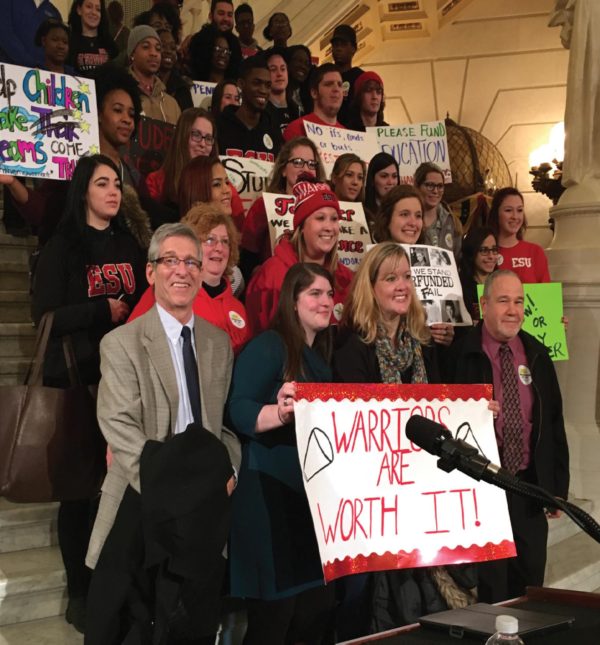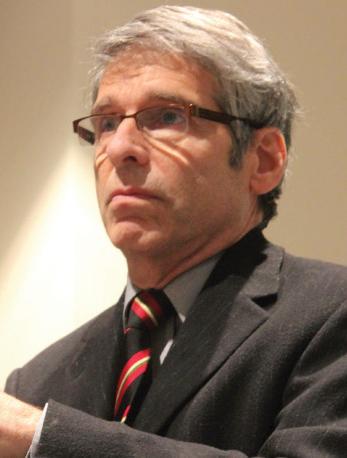
Submitted By
Dr. Allan Benn
For returning and new students this fall, the threat of a strike by professors has raised important questions: Will I graduate on time? Will the semester be canceled? Can I get a refund? Why are my professors threatening my education?
You deserve an explanation. Why are negotiations worse than usual? For that matter, what are negotiations? Is it all about the money? Far from it!
Every three or four years, the State System of Higher Education and the professors’ union (APSCUF) negotiate to set rules that both groups must follow for faculty salaries, health care costs, evaluation procedures for tenure and promotion, and much else.
The State System offered no substantial proposals until months after the old contract expired June 30, 2015. They made no salary proposal at all until you were packing your cars to head back to campus—14 months late.
Actually, two years late if they wanted sensible give-andtake talks!
Of course, money is a problem. The State System explains that in recent history, Pennsylvania has slowly cut financial support of the fourteen universities from 70 percent to about 20 percent, with your tuition dollars going from just 30 percent to 80 percent of the costs of operation.
APSCUF agrees that Pennsylvania needs to restore funding. After all, we rank 48th of the states in the level of support for public higher education. Disgraceful! We should all be writing state legislators about that.
However, to cut costs, we should not be considering changes that would greatly hurt the quality of System universities.
The System has offered APSCUF no pay increase in the first two years of the next contract, and 1 percent for the next two—far less than offered to other unions and, just last week, to 13,400 other Pennsylvania workers, most of whom received a 6 percent raise.
Campus presidents have also received hefty raises; one of them gets paid $47,000 more than in 2014. No money? Really?
Professors would also face increased healthcare costs. However, pay and healthcare are routine issues for negotiations, although the System has waited very long this time to start discussing them, thus raising the level of concern.
Perhaps more important than the pay is who should get it. Who should teach at our schools? If APSCUF accepts the changes listed below, each of the fourteen universities would be worsened.
To save money and perhaps to disarm the union, the System is insisting on lowering the general qualifications of those who teach you.

Photo Credit / Anonymous Contribution
Isn’t that the primary measure of a school’s quality? Teachers make or break the quality of a school.
If System universities reduce the use of experienced scholars, selected by a national search, evaluated heavily (before and after tenure), and required to serve in various substantial ways besides teaching, their reputations would suffer.
Students would get far less for their money. Maybe THAT is the most important money issue!
In restaurants, it’s who cooks the food. In construction, it’s who hammers the nails. In medicine, it’s who examines the patients. In education, it’s who teaches the students.
That’s what matters most in determining the quality of our schools. That quality has been well maintained, but now it is being threatened by new proposals that would affect students directly.
1. Increase online teaching. Any professor could be forced to teach online rather than in the classroom.
Also, if such online sections made some classroom sections unnecessary, then retrenchment (firing tenured professors) would be allowed.
The current contract states that classroom instruction provides the best opportunity for a quality educational experience. That is the truth.
The System wants to remove that language and, worse, that principle. Online teaching can work well, but this proposal would force more of it on both professors and on students.
Because non-synchronous online courses create no scheduling conflicts and require no rooms, they can be easily supersized. Fewer sections would equal fewer professors and less individual attention.
2. Allow involuntary, unlimited transfers of professors to other departments.
Professors could be involuntarily transferred out of the departments into which they were hired, either for all or part of their teaching.
You could be taught by an instructor whose training and scholarship are in a different discipline. Your professor’s real expertise could be wasted.
3. Expand use of instructors without doctorates or experience to teach. Such instructors, called teaching associates, would be allowed on all campuses and the number of them would not be limited.
Currently, their use is restricted to campuses and disciplines offering doctorates.
Adding insult to injury, professors paid to guide these associates would have their pay cut in half just when such mentors would be needed most.
Traditionally, use of professors rather than graduate students has been a major strength of System universities. It makes our schools superior in some ways to Penn State and other research institutions.
4. Increase use of temporary faculty (adjuncts), and slash their pay. Our adjuncts (temporary professors) are generally conscientious and competent. However, they are not required to perform as much committee work and scholarship as tenured professors, who are usually selected by national searches.
Adjuncts are never promoted, and they are already paid less than most high school teachers. No more than 25 percent of faculty can be adjuncts.
To save money, the System wants that limit raised to 30 percent, with additional exceptions allowed. About one out of every three professors would be an adjunct.
One more thing: pay for adjuncts would be cut by 20 percent. A full-time teaching load would go to five sections, one more than other professors, and adjuncts would not be rewarded for scholarship or university service.
They would be exploited as teaching machines. A doctorate would not keep them far from the poverty line, and you would be taught by underpaid and overworked instructors.
Adjuncts belong to APSCUF. The union would never allow this injustice without a fight.
Professors do not want to strike. APSCUF has never taken that legal, but awful step. We value our profession and our commitment to students. However, the above proposals, among others, make the current situation dangerous.
They would hurt past students; as schools’ reputations sink, so would the value of degrees earned by alumni.
They would hurt present students, who would see and feel the changes quickly.
Most of all, they would hurt future students, who would not have the same excellent option of affordable public higher education that you have now.
The State System must pull these proposals and start bargaining with APSCUF to protect the needs of all parties—especially students.
Allan N. Benn, Ph.D.
Distinguished Professor of English

